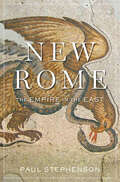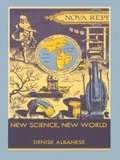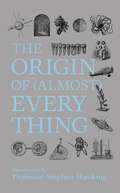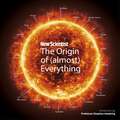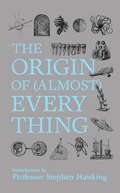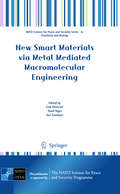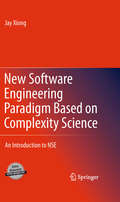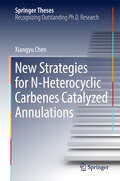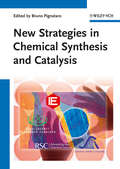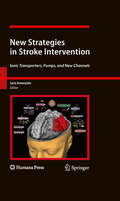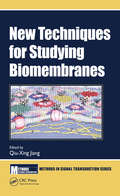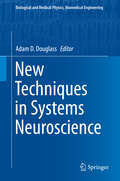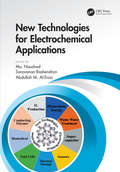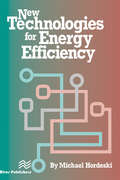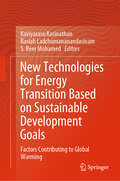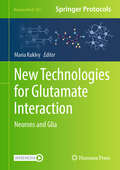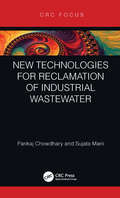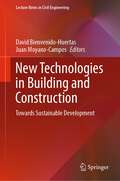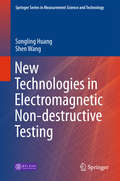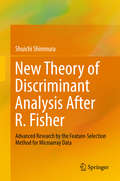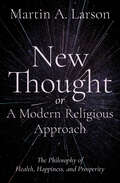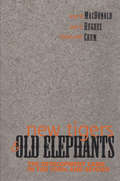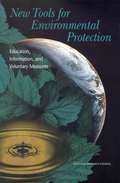- Table View
- List View
New Rome: The Empire in the East (History Of The Ancient World Ser. #6)
by Paul StephensonA comprehensive new history of the Eastern Roman Empire based on the science of the human past. As modern empires rise and fall, ancient Rome becomes ever more significant. We yearn for Rome’s power but fear Rome’s ruin—will we turn out like the Romans, we wonder, or can we escape their fate? That question has obsessed centuries of historians and leaders, who have explored diverse political, religious, and economic forces to explain Roman decline. Yet the decisive factor remains elusive. In New Rome, Paul Stephenson looks beyond traditional texts and well-known artifacts to offer a novel, scientifically minded interpretation of antiquity’s end. It turns out that the descent of Rome is inscribed not only in parchments but also in ice cores and DNA. From these and other sources, we learn that pollution and pandemics influenced the fate of Constantinople and the Eastern Roman Empire. During its final five centuries, the empire in the east survived devastation by natural disasters, the degradation of the human environment, and pathogens previously unknown to the empire’s densely populated, unsanitary cities. Despite the Plague of Justinian, regular “barbarian” invasions, a war with Persia, and the rise of Islam, the empire endured as a political entity. However, Greco-Roman civilization, a world of interconnected cities that had shared a common material culture for a millennium, did not. Politics, war, and religious strife drove the transformation of Eastern Rome, but they do not tell the whole story. Braiding the political history of the empire together with its urban, material, environmental, and epidemiological history, New Rome offers the most comprehensive explanation to date of the Eastern Empire’s transformation into Byzantium.
New Science, New World
by Denise AlbaneseIn New Science, New World Denise Albanese examines the discursive interconnections between two practices that emerged in the seventeenth century--modern science and colonialism. Drawing on the discourse analysis of Foucault, the ideology-critique of Marxist cultural studies, and de Certeau's assertion that the modern world produces itself through alterity, she argues that the beginnings of colonialism are intertwined in complex fashion with the ways in which the literary became the exotic "other" and undervalued opposite of the scientific.Albanese reads the inaugurators of the scientific revolution against the canonical authors of early modern literature, discussing Galileo's Dialogue on the Two Chief World Systems and Bacon's New Atlantis as well as Milton's Paradise Lost and Shakespeare's The Tempest. She examines how the newness or "novelty" of investigating nature is expressed through representations of the New World, including the native, the feminine, the body, and the heavens. "New" is therefore shown to be a double sign, referring both to the excitement associated with a knowledge oriented away from past practices, and to the oppression and domination typical of the colonialist enterprise. Exploring the connections between the New World and the New Science, and the simultaneously emerging patterns of thought and forms of writing characteristic of modernity, Albanese insists that science is at its inception a form of power-knowledge, and that the modern and postmodern division of "Two Cultures," the literary and the scientific, has its antecedents in the early modern world.New Science, New World makes an important contribution to feminist, new historicist, and cultural materialist debates about the extent to which the culture of seventeenth-century England is proto-modern. It will offer scholars and students from a wide range of fields a new critical model for historical practice.
New Scientist (almost) Everything: The Origin Of (almost) Everything
by Stephen Hawking New Scientist Graham Lawton Jennifer DanielFrom what actually happened in the Big Bang to the accidental discovery of post-it notes, the history of science is packed with surprising discoveries. Did you know, for instance, that if you were to get too close to a black hole it would suck you up like a noodle (it's called spaghettification), why your keyboard is laid out in QWERTY (it's not to make it easier to type) or why animals never evolved wheels? New Scientist does.And now they and award-winning illustrator Jennifer Daniel want to take you on a colorful, whistle-stop journey from the start of our universe (through the history of stars, galaxies, meteorites, the Moon and dark energy) to our planet (through oceans and weather and oil) and life (through dinosaurs to emotions and sex) to civilization (from cities to alcohol and cooking), knowledge (from alphabets to alchemy) ending up with technology (computers to rocket science). Witty essays explore the concepts alongside enlightening infographics that zoom from how many people have ever lived, to showing you how a left-wing brain differs from a right-wing one...
New Scientist (almost) Everything: from the Big Bang to Belly-button Fluff
by Stephen Hawking Graham Lawton New ScientistDOES ANYTHING EAT WASPS meets INFORMATION IS BEAUTIFUL: A journey through life, the universe and everything. From what actually happened in the Big Bang to the accidental discovery of post-it notes, science is packed with surprising discoveries. Did you know, for instance, that if you were to get too close to a black hole it would suck you up like a noodle (it's called spaghettification), why your keyboard is laid out in QWERTY (it's not to make it easier to type) or whether the invention of the wheel was less important to civilisation than the bag (think about it). New Scientist does. And now they and illustrator Jennifer Daniel want to take you on a whistlestop journey from the start of our universe (through the history of stars, galaxies, meteorites, the Moon and dark energy) to our planet (through oceans and weather to oil) and life (through dinosaurs to emotions and sex) to civilisation (from cities to alcohol and cooking), knowledge (from alphabets to alchemy) ending up with technology (computers to rocket science). Witty essays explore the concepts alongside enlightening infographics that zoom from how many people have ever lived to showing you how a left-wing brain differs from a right-wing one.(P)2017 John Murray Press
New Scientist: The Origin of (almost) Everything
by Stephen Hawking Graham Lawton New ScientistIntroduction by Professor Stephen Hawking.When Edwin Hubble looked into his telescope in the 1920s, he was shocked to find that nearly all of the galaxies he could see through it were flying away from one another. If these galaxies had always been travelling, he reasoned, then they must, at some point, have been on top of one another. This discovery transformed the debate about one of the most fundamental questions of human existence - how did the universe begin?Every society has stories about the origin of the cosmos and its inhabitants, but now, with the power to peer into the early universe and deploy the knowledge gleaned from archaeology, geology, evolutionary biology and cosmology, we are closer than ever to understanding where it all came from. In The Origin of (almost) Everything, New Scientist explores the modern origin stories of everything from the Big Bang, meteorites and dark energy, to dinosaurs, civilisation, timekeeping, belly-button fluff and beyond.From how complex life evolved on Earth, to the first written language, to how humans conquered space, The Origin of (almost) Everything offers a unique history of the past, present and future of our universe.
New Smart Materials via Metal Mediated Macromolecular Engineering
by Ezat Khosravi Yuri Savelyev Yusuf YagciControl over macromolecular architecture and resulting material properties has been a central goal of polymer chemistry. There has been much interest in developing new synthetic routes to prepare smart materials with novel compositions and topologies for various applications. The considerable progress in the metal mediated macromolecular engineering over the past decade has had a major impact on the development of well-defined macromolecular architectures and the synthesis of smart materials. Particularly, remarkable strong developments have been observed for the synthesis of smart materials via four metal mediated macromolecular engineering techniques; Anionic, ROMP, ATRP and Click Chemistry. These materials have found uses in advanced microelectronics, technical and biomedical applications as well as in chemical sensors applications. This book is comprised of 27 chapters written by leading scientists from NATO and Partner Countries who have greatly contributed in the area of Anionic, ROMP, ATRP and Click Chemistry. It highlights the fundamental aspects and recent developments of these four powerful techniques and evaluate their potential in the syntheses of smart materials from complex structures (grafts, brushes, dendrimers, etc.) to nanostructures (self-assembly, nano-size, etc) for a wide range of applications. The book reports on the synthesis of a wide range of well-defined complex polymeric systems such as thermoresponsive smart polymers, star copolymers, biocompatible polymers, amphipilic smart nano structured, conducting polymers, self assembled polymers, and hyperbranced polymers.
New Software Engineering Paradigm Based on Complexity Science
by Jay XiongThis book describes a complete revolution in software engineering based on complexity science through the establishment of NSE - Nonlinear Software Engineering paradigm which complies with the essential principles of complexity science, including the Nonlinearity principle, the Holism principle, the Complexity Arises From Simple Rules principle, the Initial Condition Sensitivity principle, the Sensitivity to Change principle, the Dynamics principle, the Openness principle, the Self-organization principle, and the Self-adaptation principle. The aims of this book are to offer revolutionary solutions to solve the critical problems existing with the old-established software engineering paradigm based on linear thinking and simplistic science complied with the superposition principle, and make it possible tohelp software development organizations double their productivity, halve their cost, and remove 99% to 99.99% of the defects in their software products, and efficiently handle software complexity, conformity, visibility, and changeability. It covers almost all areas in software engineering. The tools NSE_CLICK- an automatic acceptance testing platform for outsourcing (or internally developed) C/C++ products, and NSE_CLICK_J - an automatic acceptance testing platform for outsourcing (or internally developed) Java products are particularly designed for non-technical readers to view/review how the acceptance testing of a software product developed with NSE can be performed automatically, and how the product developed with NSE is truly maintainable at the customer site.
New Strategies for N-Heterocyclic Carbenes Catalyzed Annulations
by Xiangyu ChenThis thesis focuses on NHC-catalyzed annulation of nitroalkenes, enals and α,β-unsaturated carboxylic acids. (1) NHCs were found to be efficient catalysts for the [4+2] annulation of β-substituted nitroalkenes. The scope of Rauhut-Currier reaction was successfully extended to the most challenging β-substituted alkenes by this method; (2) Enals were successfully used for [4+2] annulations with azodicarboxylates catalyzed by NHC via γ-addition. Highly enantiopure tetrahydropyridazinones and γ-amino acid derivatives could be easily prepared by subsequent transformations of the resulting dihydropyridazinones. (4) The readily available α,β-unsaturated carboxylic acids were first successfully employed to generate the α,β-unsaturated acyl azolium intermediates by using NHC for the enantioselective [3+2] and [3+3] annulations.
New Strategies in Chemical Synthesis and Catalysis
by Bruno PignataroThis volume represents one of the two edited by inviting a selection of young researchers participating to the European Young ChemistAward 2010. The other volume concerns the area of Nanotechnology/Material Science and is titled: Molecules at Work.This book contains the contributions of selected young chemists from the field of synthetic chemistry. The contributions are groupedunder the three following umbrella topics:Synthetic MethodsCatalysisCombinatorial and Chemical BiologyThis volume is an indispensable read for all organic and inorganic chemists, biochemists, chemists working with/on organometallics,and Ph.D. students in chemistry interested in seeing what tomorrow's chemistry will look like.
New Strategies in Stroke Intervention
by Lucio AnnunziatoIschemic brain damage represents a major source of morbidity and mortality in westernized society and poses a significant financial burden on the health care system. To date, few effective therapies have been realized. Recent evidence, however, suggests that channels, pumps, and ionic exchangers are involved in CNS ischemia and ischemic stroke, but the potential contribution of these channels for curing stroke is far less understood than for many other normal and pathological conditions. New Strategies in Stroke Intervention: Ionic Channels, Pumps, and Transporters, analyzes the roles played by targets in stroke development and the potential action of drugs modulating these proteins. This book provides a groundbreaking review of these ionic channels, pumps, and transporters as regulators of neuronal ionic homeostasis, providing a better understanding of ischemic brain disorders and the new pharmacological avenues for a cure.
New Strategies to Advance Pre/Diabetes Care: Integrative Approach by PPPM
by Mahmood S. MozaffariThis book is intended to provide up-to-date and emerging information in the field of diabetes mellitus with a focus on preventive, predictive and personalized medicine.
New Techniques for Studying Biomembranes (Methods in Signal Transduction Series)
by Qiu-Xing JiangNew Techniques for Studying Biomembranes describes some of the latest methods used to investigate the dynamic distribution of specific lipids in membranes and their effects on other membrane components. The contributors present important discoveries with respect to lipid analysis and lipid interactions with membrane proteins. Various methods, which have been used to study lipid bilayer structure and lipid organization in membranes, include both in vitro and in vivo membrane systems, and study membrane proteins in various membrane systems. Key Features: Reviews both in vivo and in vitro analytical technologies and methods for studying membrane structure and function Explores how lipid bilayers and membrane proteins interact Includes contributions from an international team of researchers actively studying membrane structure and function Identifies various diseases whose causes are related to membrane proteins Related Titles: Christopher R. Jacobs, Hayden Huang, and Ronald Y. Kwon. Introduction to Cell Mechanics and Mechanobiology (ISBN 978-0-8153-4425-4) Wendell Lim and Bruce Mayer. Cell Signaling: Principles and Mechanisms (ISBN 978-0-8153-4244-1) Stephen Rothman. Proteins Crossing Membranes: A Scientist’s Memoir (978-0-3670-7449-4)
New Techniques in Systems Neuroscience
by Adam D. DouglassThis volume is essential reading for anyone wishing to understand the recent explosion of experimental tools in neuroscience that now make it possible to manipulate, record, and understand neuronal activity within the intact brain, and which are helping us learn how the many neurons that comprise a network act together to control behavior. Leaders in the field discuss the latest developments in optogenetics, functional imaging, circuit mapping, and the application of these tools to complex biological problems.
New Technologies for Electrochemical Applications
by Mu. Naushad Saravanan Rajendran Abdullah M. Al-EniziThe field of electrochemistry is exploring beyond its basic principles to innovation. New Technologies for Electrochemical Applications presents advancements in electrochemical processes, materials, and technology for electrochemical power sources such as batteries, supercapacitors, fuel cells, hydrogen storage and solar cells. It also examines various environmental applications such as photo electrochemistry, photosynthesis, and coating. Organized to give readers an overview of the current field in electrochemical applications, this book features a historical timeline of advancements and chapters devoted to the topics of organic material and conducting polymers for electrochemical purposes. Established experts in the field detail state-of-the-art materials in biosensors, immunosensors, and electrochemical DNA. This edited reference is a valuable resource for graduate and post-graduate students, and researchers in disciplines such as chemistry, physics, electrical engineering and materials science.
New Technologies for Energy Efficiency
by Michael Frank HordeskiFirst published in 2002. This book examines the full scope of technologies available to address the electricity supply crisis. The author details the tools and technologies available for incorporating smaller, cleaner, more efficient energy into energy management plans. He examines the role of new technologies in reducing operating costs and developing more innovative and practical approaches to energy management. Topics include implementation of alternative energy programs, management of power quality, cost-effective power generation solutions, cost-effective energy services, information monitoring and diagnostic systems, energy storage options, integration of lighting and cooling systems, and more.
New Technologies for Energy Transition Based on Sustainable Development Goals: Factors Contributing to Global Warming
by Kaviyarasu Kasinathan Rasiah Ladchumananandasivam S. Beer MohamedThis book describes numerous issues and brings an improved understanding of a key agenda item for the sustainable development goals (SDGs). The SDGs represent an urgent call for action by all countries, developed and developing, working jointly within the global community. A few of the industries it supports include food processing, energy, biomedical science, space research, drug delivery, and biosensors. This book highlights multidisciplinary solutions for protecting the environment while ensuring the future of our planet. The book mainly targets undergraduates, postgraduates, and doctoral students who are working in materials science and researchers across the world working in interdisciplinary research for climate change for sustainable growth.
New Technologies for Glutamate Interaction: Neurons and Glia (Neuromethods #2780)
by Maria KukleyThis volume explores the latest technologies used to study the co-existence of neuronal and neuron-glia synapses in the brain. The chapters in this volume are organized into three parts. Part One covers recent advancements in the technical approaches for studying glutamatergic signalling between neurons. Part Two highlights approaches to study the functional role of astrocytes at neuronal synapses. Part Three focuses on fast signalling at neuron-glia synapses, and highlights relevant methods for investigating these unusual synapses, including slice electrophysiology and in vivo gene delivery techniques. In the Neuromethods series style, all chapters contain key advices from experts in the field that are valuable for performing successful experiments on the topic in your laboratory.Cutting-edge and thorough, New Technologies for Glutamate Interactions: Neurons and Glia is a valuable resource for both neuronal and glial physiologists who are interested in learning about and developing new methods to further understand neuronal and neuron-glia synaptic transmission.
New Technologies for Reclamation of Industrial Wastewater
by Pankaj Chowdhary Sujata ManiNew Technologies for Reclamation of Industrial Wastewater provides information on several types of industrial wastewaters containing a variety of toxic and recalcitrant compounds. It also focuses on the ecotoxicological and health hazards posed by the chemicals released along with industrial effluents. It covers various conventional as well as modern wastewater-treatment technologies and their advantages and disadvantages. Features: Elucidates various types of industrial wastewaters generated, their fate and consequences Describes the ecotoxicological and health implications of industrial contaminants Provides details on conventional treatment technologies along with modern and emerging wastewater-treatment methods Discusses the merits and demerits of both conventional and emerging treatment technologies
New Technologies in Building and Construction: Towards Sustainable Development (Lecture Notes in Civil Engineering #258)
by David Bienvenido-Huertas Juan Moyano-CamposThis book presents contributions on new technologies in building and construction. Buildings are complex elements that impact environment significantly. The sustainability of this sector requires a holistic and multidisciplinary approach that allows adequate strategies to be established to reduce its environmental impact. This heterogeneity is represented in these chapters, which have been developed by researchers from different countries. The book is divided into three sections: (i) analysis, (ii) design and modeling, and (iii) solutions. The book chapters together represent an advance in current knowledge about new technologies in building and construction, crucial for researchers, engineers, architects, policy makers, and stakeholders.
New Technologies in Electromagnetic Non-destructive Testing
by Songling Huang Shen WangThis book introduces novel developments in the field of electromagnetic non-destructive testing and evaluation (NDT/E). The topics include electromagnetic ultrasonic guided wave testing, pulsed eddy current testing, remote field eddy current testing, low frequency eddy current testing, metal magnetic memory testing, and magnetic flux leakage testing. Considering the increasing concern about the safety maintenance of critical structures in various industries and everyday life, these topics presented here will be of particular interest to the readers in the NDT/E field. This book covers both theoretical researches and the engineering applications of the electromagnetic NDT technology. It could serve as a valuable reference for college students and relevant NDT technicians. It is also a useful material for qualification training and higher learning for nondestructive testing professionals.
New Theory of Discriminant Analysis After R. Fisher
by Shuichi ShinmuraThis is the first book to compare eight LDFs by different types of datasets, such as Fisher's iris data, medical data with collinearities, Swiss banknote data that is a linearly separable data (LSD), student pass/fail determination using student attributes, 18 pass/fail determinations using exam scores, Japanese automobile data, and six microarray datasets (the datasets) that are LSD. We developed the 100-fold cross-validation for the small sample method (Method 1) instead of the LOO method. We proposed a simple model selection procedure to choose the best model having minimum M2 and Revised IP-OLDF based on MNM criterion was found to be better than other M2s in the above datasets. We compared two statistical LDFs and six MP-based LDFs. Those were Fisher's LDF, logistic regression, three SVMs, Revised IP-OLDF, and another two OLDFs. Only a hard-margin SVM (H-SVM) and Revised IP-OLDF could discriminate LSD theoretically (Problem 2). We solved the defect of the generalized inverse matrices (Problem 3). For more than 10 years, many researchers have struggled to analyze the microarray dataset that is LSD (Problem 5). If we call the linearly separable model "Matroska," the dataset consists of numerous smaller Matroskas in it. We develop the Matroska feature selection method (Method 2). It finds the surprising structure of the dataset that is the disjoint union of several small Matroskas. Our theory and methods reveal new facts of gene analysis.
New Thought, or A Modern Religious Approach: The Philosophy of Health, Happiness, and Prosperity
by Martin Alfred LarsonThe renowned historian examines the evolution of the New Thought Movement from its eighteenth-century European roots to twentieth-century America. In this enlightening study, Martin A. Larson presents New Thought as a rebellion against the conventional dogmas of Western religion. He begins with an in-depth look at the work of Emanuel Swedenborg, the philosopher and Christian mystic who was compelled to publish his theological writing anonymously outside his native Sweden. In the United States, however, the Shakers and their predecessors were able to avoid persecution despite setting forth a complete repudiation of traditional Christian doctrine. They achieved this by accepting the Bible as divine revelation while denying its literal meaning. Through the process of Spiritual Interpretation, they supplanted orthodox religion with a totally new system of faith and belief. This work is dedicated to all those seeking truth in a religion that meets the needs of modern life. The author pays special tribute to such forerunners as Michael Servetus, Emanuel Swedenborg, Phineas Quimby, Warren Felt Evans, Horatio W. Dresser, Ralph Waldo Trine, Emma Curtis Hopkins, Charles Fillmore, Ernest S. Holmes, Thomas Troward, Joseph Murphy, and a host of others who have contributed to the movement known as New Thought, a philosophy of health, happiness, and prosperity.
New Tide of Natural Product Chemistry
by Hayato Ishikawa Hiromitsu TakayamaThis book highlights recent research and advances in natural product chemistry written by promising young researchers in this field who have played a central role for recent innovative advancements. The book consists of seventeen chapters covering novel bioactive natural products, uncovering life phenomena with natural products, biosynthesis of natural products, total synthesis of complex natural products by innovative strategies, and drug discovery using natural products. Each chapter begins with a brief and easy-to-understand introduction, then presents the cutting-edge research in each individual specialty. This book is not only a practical and essential reference resource for natural product chemists, medicinal chemists, synthetic organic chemists, biochemists, pharmacologists, as well as the pharmaceutical and biotechnological industries, but is also a useful guide to understanding new and emerging trends in this field.
New Tigers and Old Elephants: The Development Game in the 21st Century and Beyond
by Sophonisba BreckinridgeWhich factors identify "winners" (tigers) in the development game and which characterize "losers" (elephants) are described in this approach to understanding economic development in a post-cold war environment.
New Tools for Environmental Protection: Education, Information, and Voluntary Measures
by Committee on the Human Dimensions of Global ChangeMany people believe that environmental regulation has passed a point of diminishing returns: the quick fixes have been achieved and the main sources of pollution are shifting from large "point sources" to more diffuse sources that are more difficult and expensive to regulate. The political climate has also changed in the United States since the 1970s in ways that provide impetus to seek alternatives to regulation.This book examines the potential of some of these "new tools" that emphasize education, information, and voluntary measures. Contributors summarize what we know about the effectiveness of these tools, both individually and in combination with regulatory and economic policy instruments. They also extract practical lessons from this knowledge and consider what is needed to make these tools more effective.The book will be of interest to environmental policy practitioners and to researchers and students concerned with applying social and behavioral sciences knowledge to improve environmental quality.
